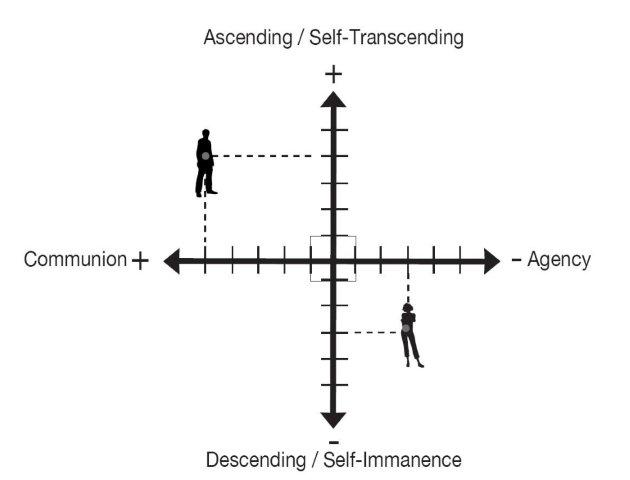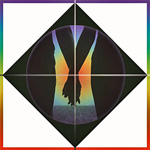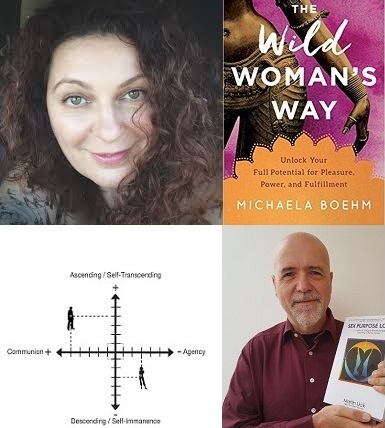Michaela Böhm worked with David Deida for 13 years and is one of the most gifted and in-demand relationship teachers, speakers, and counselors to be found globally today.
Watch the episode on the Integral Love Relationship YouTube Channel at www.youtube.com/channel/UCsZbcLqZXmhqjKA1Rf-vqyg.
Michaela and Martin explored the harmonizing and including of all aspects of the masculine and feminine within, and how that looks on the outside, and how to polarize for sexual attraction in relationship and when (and when not) it’s appropriate.

This will add greatly to Integral theory, where feminine means to be communal and descending, and masculine means to be agentic and ascending. Males and females can potentially embody and express either of these polarities as shown in the image below.

To maintain our simultaneous partialness and wholeness in a healthy love relationship (and life in general), we need to balance and harmonize healthy agency, communion, ascending, and descending.
You can feel into these four polarities right now in a relational context:
Ascending (self-transcendence) in its healthy form is your drive towards co-creating a healthy love relationship; to surrender your separate sense of self or Ego, and to show humility; to recognize that, as one person put it, “One plus one equals everything, and two minus one equals nothing”; to co-create synergy, to advance into novelty with your partner, and to serve a purpose that is larger than either individual and put into service of the greatest good for the largest number of people. In its unhealthy form, the ascending drive will neglect the needs of the individual holons (you and your partner) that make up the larger whole (the love relationship).
Descending (self-immanence) in its healthy form is your drive to care for yourself in the relationship, to maintain the wellness of your physical body through a wholesome diet, exercise and rest, and to connect on the level of feelings and sexuality. In its unhealthy form, the descending drive will lead to the dissolution, decomposition, or deconstruction of the larger whole (the love relationship) by focusing too much on yourself (often in an egocentric or narcissistic way, including New Age narcissism),[i] (see endnote below) loving oneself or a pet more than a partner, and losing sight of the greater good.
Agency (self-preservation) in its healthy form is your drive to maintain your own and the wholeness, integrity, independence, and autonomy of your love relationship, family, team, organization, community, or countryas well as to be stable, faithful, and devoted. In its unhealthy form, agency leads to conflict, isolation, alienation, and loneliness.
Communion (self-adaptation) in its healthy form is your drive towards acting in partnership with others, to connect, join, communicate, participate, fit in, consider, take responsibility, compromise, cooperate, and to show empathy. In its unhealthy form, communion leads to dependence, fusion, and loss of independent functioning and free will.
Since we can’t simultaneously ascend and descend (e.g. breath in and out) and be agentic and communal (being alone and together) we need a partner to stay balanced and harmonized between the polarities. This can be done with a partner who is predominantly opposite from us, or by taking turns in the healthy expression of all four polarities, like being on a teeter totter, or partner-dancing with one person leading and the other following, both flowing from moving close together and further apart. Either way creates attraction and synergy through an energy flow (think of a magnet, battery, or giving-receiving during sex.) Otherwise the couple will experience stagnation and conflict through the absence of flow between the two polarities.
If healthy ascending is absent, then forming and maintaining a relationship is either not possible or not a priority because there is too much emphasis on the individual (agency) and his or her own body or feelings (descending).
If healthy descending is absent, there is no care for the individual, especially the body and feelings, no emotional and sexual depth, no capacity or willingness to do shadow work, and no care for the earth and other sentient beings.
If healthy agency is absent, the partners become co-dependent or dependent in an unhealthy way and cannot maintain their individuality and responsibility for their choices, which often leads to blaming others and feelings of victimhood. In addition, they also lack a focus on maintaining the wholeness and integrity of their partnership and family.
If healthy communion is absent, the partners in a love relationship do not express and coordinate their needs, goals, and actions through caring, considerate, and compassionate communication. They also don’t take responsibility for the effect of their actions on others.
[i] The rise of postmodern pluralistic relativism, in which individuals see themselves and all others as unique and special (we are all gods/goddesses) produced New Age narcissism that is focused on self-love vs. the love of others, with the argument that everyone creates their own reality and that we need to learn to love ourselves before we can love others. This often prevents the formation of healthy sustainable love relationships.
See Sandy Hotchkiss and James F. Masterson, Why Is It Always About You?: The Seven Deadly Sins of Narcissism:
Shamelessness: Shame is the feeling that lurks beneath all narcissism which is the inability to process shame in healthy ways.
Magical thinking: Narcissists see themselves as perfect, using distortion and illusion known as magical thinking. They also use projection to dump shame onto others.
Arrogance: A narcissist who is feeling deflated may re-inflate by diminishing, debasing, or degrading somebody else.
Envy: A narcissist may secure a sense of superiority in the face of another person’s ability by using contempt to minimize the other person.
Entitlement: Narcissists hold unreasonable expectations of particularly favorable treatment and automatic compliance because they consider themselves special. Failure to comply is considered an attack on their superiority, and the perpetrator is considered an “awkward” or “difficult” person. Defiance of their will is a narcissistic injury that can trigger narcissistic rage.
Exploitation: Can take many forms but always involves the exploitation of others without regard for their feelings or interests. Often the other is in a subservient position where resistance would be difficult or even impossible. Sometimes the subservience is not so much real as assumed.
Bad boundaries: Narcissists do not recognize that they have boundaries and that others are separate and are not extensions of themselves. Others either exist to meet their needs or may as well not exist at all. Those who provide narcissistic supply to the narcissist are treated as if they are part of the narcissist and are expected to live up to those expectations. In the mind of a narcissist, there is no boundary between self and other.
Healthy Form of Self-Love:
“If you love yourself, you love everybody else as you do yourself. As long as you love another person less than you love yourself, you will not really succeed in loving yourself, but if you love all alike, including yourself, you will love them as one person and that person is both God and man. Thus he is a great and righteous person who, loving himself, loves all others equally.”
Meister Eckhart, translated by R.B. Blakney, Harper & Brothers, New York, 1941, p. 204.


cialis from canada http://andere.strikingly.com/
You actually mentioned that effectively!